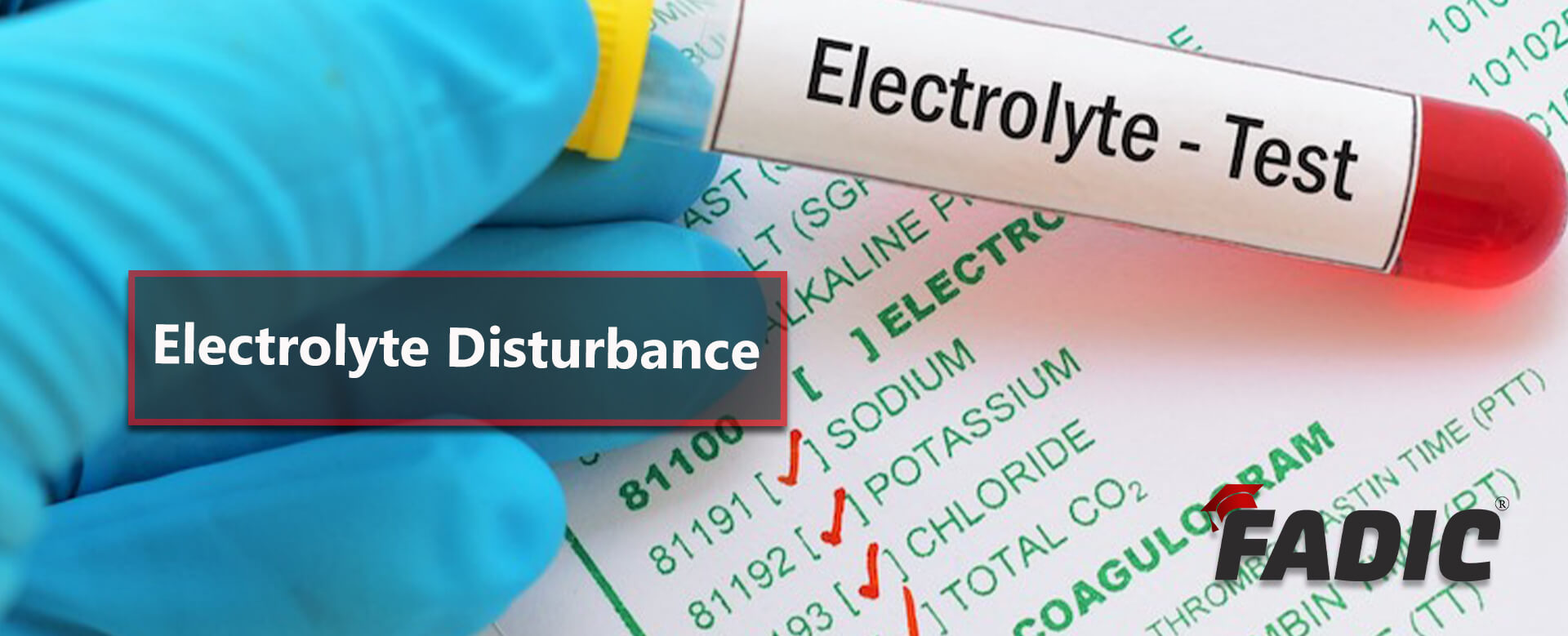Electrolytes Disturbance
Electrolytes Disturbance

- Introduction of Electrolytes Disturbance
- Many causes for an electrolyte imbalance
- Certain medications may cause an electrolyte imbalance
- Symptoms of an electrolyte imbalance
- Diagnosing electrolyte disorders
- Physical Examination in children
- Laboratory Tests
- What Should Clinicians Know about the Electrolytes Disturbance?
- Prevention of an Electrolytes Disturbance
- How can you care for yourself at home?
- Maintaining electrolyte levels
Introduction of Electrolytes Disturbance:
- The body’s nerve reactions and muscle function are dependent upon the proper exchange of these electrolyte ions outside and inside cells.
- They control important physiologic functions such as calcium, chloride, magnesium, phosphate, potassium and sodium.
- These substances are present in the blood, bodily fluids, and urine. They’re also ingested with food, drinks, and supplements.
- An electrolyte disorder occurs when the levels of electrolytes in the body are either too high or too low.
- Electrolytes need to be maintained in an even balance for body to function properly. Otherwise, vital body systems can be affected.
Highly recommend online Marketing tool from SEMRUSH
Electrolytes Disturbance
Electrolytes are minerals in the blood, tissues, and elsewhere throughout the body.
Each electrolyte plays a specific role in the body.
The following are some of the most important electrolytes and their primary functions:
Sodium
- It Helps control fluids in the body, impacting blood pressure.
- This is necessary for muscle and nerve function.
Chloride
- It helps balance electrolytes
- As it balances acidity and alkalinity, which helps maintain a healthy pH.
- This is essential for digestion.
Potassium
- It regulates the heart and blood pressure
- As it helps balance electrolytes
- Then, aids in transmitting nerve impulses
- Moreover, contributes to bone health
- This is necessary for muscle contraction
Magnesium
- This is important for the production of DNA and RNA
- As it contributes to nerve and muscle function
- Moreover, it helps maintain heart rhythm
- Therefore, it regulate blood glucose levels
- It enhances the immune system
Calcium
- It is an essential component of bones and teeth
- This is important for the movement of nerve impulses and muscle movement
- As it contributes in blood clotting
Phosphate
- This strengthens bones and teeth
- It helps cells produce the energy needed for tissue growth and repair
Bicarbonate
- It helps the body maintain a healthy pH
- It regulates heart function
There are many causes for an electrolyte imbalance which may include:
- Loss of body fluids from prolonged vomiting, diarrhea, sweating or high fever
- Inadequate diet and lack of vitamins from food
- Malabsorption
- Hormonal or endocrine disorders
- Kidney diseases
- Moreover, Tumor lysis syndrome.
- Furthermore, this occurs when the body breaks down tumor cells rapidly after chemotherapy, causing a low blood calcium level, high blood potassium levels, and other electrolyte abnormalities.
Certain medications may cause an electrolyte imbalance such as:
- Chemotherapy drugs (cisplatin)
- Diuretics (furosemide[Lasix] or bumetanide [Bumex])
- Antibiotics (amphotericin B)
- Corticosteroids (hydrocortisone)
Symptoms of an electrolyte imbalance:
The body responds to an electrolyte imbalance in a variety of ways.
This effects may depend on which electrolyte levels are imbalanced, how severe the issue is, and whether the person has other health conditions.
Moreover, the researchers report that the most common symptoms were:
- Fever
- Shortness of breath
- Confusion
- Swelling or bloating
- Rapid heart rate
- Irregular heartbeat
Other symptoms can include:
- Irritability
- Fatigue
- Numbness
- Tingling
- Muscle weakness
- Twitching
- Spasms
- Blood pressure changes
- Seizures
In children:
- Children have a higher risk of dehydration than adults because of their smaller size and faster metabolism of fluids and electrolytes.
- In addition to, if a child gets sick with severe vomiting or diarrhea, they may develop an electrolyte imbalance that requires medical attention.
- A child with an underlying health condition — such as thyroid, heart, or kidney disease — may have a higher risk of an electrolyte imbalance.
In older adults:
- Studies have found that older adults may be more susceptible to dehydration and electrolyte imbalances than younger adults.
- Moreover, there are many reasons for this, including:
- The kidneys may lose some of their function with age.
- Older adults may take multiple medications, such as diuretics, that can change electrolyte levels.
- They may not get enough to eat or drink due to disability, lack of appetite or thirst, or because they do not have regular access to food and drink.
Diagnosing electrolyte disorders:
- A simple blood test can measure the levels of electrolytes in the body. kidney function test is important as well.
- An electrocardiogram (ECG or EKG), an electrical tracing of your heart.
- Additionally, it may also be useful to check for any irregular heartbeats, rhythms, or ECG or EKG changes brought on by electrolyte problems.
Physical Examination in children
- The doctor asks if the child has been ill recently and whether he had any unusual symptoms, such as muscle cramps, dizziness, rapid heart rate, or confusion.
- The doctor measures the child’s blood pressure. In addition, he or she may examine the child’s skin to check its elasticity.
- Moreover, the doctor may also test the child’s reflexes, which can be affected by dehydration.
Laboratory Tests
- Blood and urine tests are used to confirm an electrolyte imbalance and determine its severity.
- However an electrolyte imbalance is usually diagnosed based upon information obtained through:
- The history of symptoms.
- A physical examination by your healthcare provider.
- Urine and blood test results.
- If there are other abnormalities based on these findings, your healthcare provider may suggest further testing, such as an EKG. (Severely high or low potassium, magnesium and/or sodium levels can affect your heart rhythm.)
- If you have an electrolyte imbalance due to kidney problems, your healthcare provider may want to do an ultrasound or x-ray of your kidneys
- Electrolyte abnormalities are among the most common causes of cardiac arrhythmias, and they can cause or complicate attempted resuscitation and postresuscitation care.
- Furthermore, a high degree of clinical suspicion and aggressive treatment of underlying electrolyte abnormalities can prevent these abnormalities from progressing to cardiac arrest.
- Differentiating electrolyte disturbances can be difficult in the field, with many overlapping signs and symptoms.
- Moreover, here are a couple of key points for patient assessment and treatment:
-
- Additionally, these different disorders, hyperkalemia is the most significant one to be aware of.
- Moreover, patients with kidney disease, especially those requiring dialysis are at significant risk for hyperkalemia.
- Suspect an electrolyte disorder if the patient has had a period of prolonged nausea, vomiting and or diarrhea. Suspicions should rise if there is a history of renal disease.
- Unexplained weakness, muscle spasms and numbness or tingling may point to an electrolyte disturbance.
- An electrolyte imbalance may be the underlying cause in patients with altered mental status or reduced level of consciousness.
What Should Clinicians Know about the Electrolytes Disturbance?
- Clinicians should be knowledgeable about electrolyte homeostasis and the underlying pathophysiology of electrolyte disorders to provide optimal therapy for patient.
- Moreover, the treatment plan depends on the severity of the electrolyte imbalance, underlying conditions, and root causes.
- In addition to the treatment plan may include:
- Nutrition and hydration: Correct nutrition and hydration may correct electrolyte imbalances. It is also essential to avoid electrolyte imbalances altogether.
- Supplements: Supplementation can help replace depleted electrolytes and correct imbalances. Supplements can be utilized on a short and a long-term basis.
- IV fluids: it can help to rehydrate the body typically through sodium chloride. They are often used when the patient is dehydrated from diarrhea or vomiting. Electrolyte supplements may be added to correct deficiencies in the short-term.
- Certain IV medications: IV medications may be used to balance the electrolyte levels quickly and to offer a short-term solution.
- Oral medications: the doctor may prescribe oral medications to correct chronic mineral abnormalities, especially if the patient has kidney disease.
- Hemodiaysis: it used to remove waste from the blood if your electrolyte imbalance is the result of kidney damage and if other treatments aren’t working.
Prevention of an Electrolytes Disturbance:
- A well-balanced diet including variety of fruits and vegetables can help prevent electrolyte imbalance.
- The most replenishing balance of electrolytes includes tomatoes and bananas, although water-laden fruit, such as watermelons, apples and pineapples, are also beneficial in maintaining electrolytes.
- Adequate potassium level maintenance can be achieved by eating sweet potatoes, bananas, avocados, spinach and oranges. After exercising, it is important to cool your body down before drinking water.
- In addition to, this decreases water loss and increases electrolyte absorption.
- Supplements can be used if you have difficulty getting sufficient minerals from your diet.
- Moreover, after experiencing excessive diarrhea or vomiting, you can sip electrolyte replacement drinks or ices designed to treat infants.
- Furthermore, these help with your electrolyte levels and are easy on your stomach.
- While consumption of water is important in maintaining proper hydration, to prevent electrolyte imbalance, it is important not do overdo it.
- Severe hydration, as opposed to dehydration, can also lead to vomiting and diarrhea causing the electrolyte imbalance.
- An oral rehydration solution (ORS) that contains the right balance of electrolytes can be helpful for people who have diarrhea or vomiting, or for athletes who compete in endurance events.
How can you care for yourself at home?
- Take your medicines exactly as prescribed. Call your doctor or nurse call line if you have any problems with your medicines.
- Moreover, do not take any medicine without talking to your doctor first. This includes prescription, over-the-counter, and herbal medicines.
- If you have kidney, heart, or liver disease and have to limit fluids, talk with your doctor before you increase the amount of fluids you drink.
- In addition to, your doctor or dietitian may give you a diet plan to help balance your minerals. Follow the diet carefully.
Maintaining electrolyte levels:
- The best way to keep electrolytes balanced in your body is by paying attention to your thirst.
- Dr. Jones recommends drinking about two cups of fluid two hours before any physical activity.
- Then, try to drink 4 to 6 ounces every 15 to 20 minutes during physical activity.
- Finally, have a drink after you finish exercising.
- To summarize, Electrolytes are minerals in the body that have an electric charge. They are in blood, urine, tissues, and other body fluids.
- Electrolytes are important because they help in many physiological functions.
- Electrolyte imbalances such as increased or decreased concentrations of sodium, potassium, and calcium in the blood which cause many different medical problems.
- If severe, these imbalances can lead to some significant and even life-threatening problems.
- The treatment helps to manage the imbalance.
- It also involves identifying and treating what caused the imbalance.
Read More:
- Register Now in FADIC Clinical Research School
- FADIC Drug Information Fellowship
- Buy FADIC Toolkit for Writing Research to Write a Great Research Paper
- Read 10 Skills You Must Learn to Make a Research via Google Scholar in Arabic
- The FADIC Online Continuous Medical Improvement Programs & Mini-Courses.
- Check Now FADIC Book store and Buy books in different specialties.
- Watch Now FADIC TV to Keep your self Updated.
- FADIC Podcast focusing on varieties of pharmacist perspectives in different specialties.
- Subscribe Now in FADIC 2020 Daily News (FNN) and Keep Updated.
- Check Now about Coronavirus Resource Information Center.

 Log in
Log in Sign up
Sign up